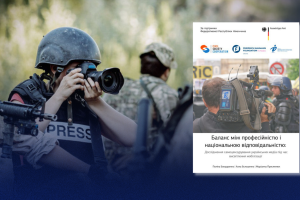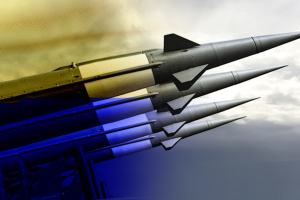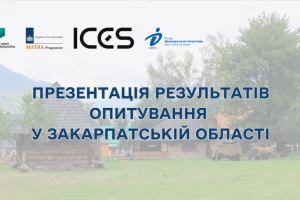A nationwide public opinion survey in Ukraine was conducted by the Ilko Kucheriv Democratic Initiatives Foundation jointly with the Razumkov Center sociological service on August 16-22, 2018 in all regions of Ukraine excluding the Crimea and occupied territories of the Donetsk and Luhansk oblasts. 2,019 respondents were polled aged 18 years and older. The theoretical sample error does not exceed 2.3%.
For comparison, results are provided of nationwide surveys that were jointly conducted by the Ilko Kucheriv Democratic Initiatives Foundation and partners in May 2013, March 2014, December 2016, December 2017 and May 2018.
This survey is presented by the Ilko Kucheriv Democratic Initiatives Foundation within the framework of the ENGAGE program for promoting civic activity, which is financed by the U.S. Agency for International Development (USAID) and implemented by Pact Ukraine. The content of this study is the sole responsibility of Pact and its partners and does not necessarily reflect the views of the U.S. Agency for International Development (USAID) or the U.S. Government. Financing for the survey was provided through the MATRA program of the Embassy of the Netherlands in Ukraine.
- The overwhelming majority of citizens (70%) intend to participate in the presidential elections in Ukraine, while 23% (6% more than in May 2018) do not want to participate. The rest of the respondents have not yet decided whether they will participate. Donbas differs from the rest of the regions, with 36% of those polled saying they do not intend to participate in the elections.
- The main reason why voters are not inclined to vote is the absence of a candidate worth voting for (30% of those who do not plan to participate in the elections). This reasoning is particularly widespread in the West (52%) and Donbas (52%). The Donbas region differs considerably in this regard: the main reason why residents of this region do not want to participate in the elections is a lack of faith that the elections will be honest (62% of those who are not inclined to vote) and a lack of interest in political in general (42%).
- Among the presidential candidates, Yulia Tymoshenko’s ranking grew significantly in recent months: from 13.3% in May to 17.8% in August (among respondents who intent to participate in the elections). Next is Anatoliy Grytsenko – 8.4%, Petro Poroshenko – 7.9%, Vadim Rabinovich – 6.7%, Yuriy Boyko – 6.4%, Volodymyr Zelensky – 6.1%, Oleh Lyashko – 5.8%, Svyatoslav Vakarchuk – 5.6%. The percentage of those supporting “another candidate” dropped significantly from 9.7% in May to 3.7% in August. There are different levels of support in various regions. Two candidates – Yulia Tymoshenko and Petro Poroshenko – have support in nearly all regions of Ukraine (Poroshenko with the exception of the East). Anatoliy Grytsenko and Svyatoslav Vakarchuk are supported mostly in the West and Center, and Vadim Rabinovich and Yuriy Boyko in the South, East and Donbas. Oleh Lyashko has better results in the Center and South, and Volodymyr Zelensky in the South and Donbas. There is a noticeable trend of growing support for Boyko, Rabinovich and Tymoshenko among older age groups, and for Vakarchuk and Zelensky among youth.
- Only 37% of voters consider their choice in candidate final, while another 47% said they favor a particular candidate now but could still change their minds, and for another 11% everything could still change. No candidate has a share of stable supporters that exceeds half of potential voters. The highest such figures are for Rabinovich (50%), Tymoshenko (46%), Boyko (45%) and Grytsenko (42%), with lower figures for Lyashko (37%), Poroshenko (36%) and Vakarchuk (33%), while the percentage of definite supporters of Zelensky is only 16%.
- Among the factors that most influence choice of candidate, the following were most significant: candidate’s personal qualities (57%), previous activities (43%) and program and proposals (40%).
- With regard to motivations for choosing a candidate, there are two main motives for nearly all candidates: liking the candidate (a significant motive for 36% of voters) and the candidate’s ideas and proposals (also 36%). But the rest of the motives behind the choice are different for various candidates: for Yulia Tymoshenko’s voters it is important that she “sees real ways to overcome the economic crisis and ensure the country’s economic growth” (35%); that same motive applies to voters for Oleh Lyashko (32%). For voters for Vadim Rabinovich, Yuriy Boyko and Anatoliy Grytsenko it is important that these candidates will be able to ensure peace in Donbas (34% for Rabinovich voters, 34% for Grytsenko voters, and 31% for Boyko voters). For Boyko voters it is also important that he belongs to a party they support (32%). Svyatoslav Vakarchuk and Volodymyr Zelensky are attractive to their voters as individuals (half of voters for both candidates), one third of their voters see them as “fresh blood,” which the government badly needs. With Zelensky there is also hope that “he will care about people like me.” The motivations for voters supporting Petro Poroshenko differ the most from the rest: his voters appreciate him for what he has already been done for Ukraine (33%) and that he is respected in the world (25%).
- The majority of citizens (71%) support holding public debates between the top candidates: 38% consider participation in these debates mandatory and another 34% consider it desirable. Twenty-eight percent of Ukrainians will watch the debates regardless, and another 44% will watch if they are interesting.
- The five most interesting debate topics were: “How do you achieve peace in Donbas? How do you achieve the liberation of occupied territories of Donbas and integrate them into Ukraine?” (44%); “If elected president, which of the country’s problems will the candidate solve first?” (41%); “Development program for Ukraine for the years of one’s presidency and the longer-term.” (36%); “How will you ensure that living standards for Ukrainians increase?” (35%); “How will you overcome corruption in Ukraine?” (33%).
- Only 17% of Ukrainians believe the presidential elections will be honest; another 40% are certain the elections will not be very honest; and 29% are certain the elections will not be honest at all.
- Thirty-four percent of citizens believe the situation will change for the better after the presidential elections; almost the same percentage – 30 – are certain nothing will change; but only 11% predict a change for the worse.
- The level of potential readiness to participate in the elections to the Verkhovna Rada of Ukraine is approximately the same as the presidential elections (68%), while 23% of respondents are not inclined to participate in the elections. The main reasons for not participating in the elections are: not seeing anyone to vote for (19%) and not believing the elections will be honest (17%). The greatest distrust in the honestly of the parliamentary elections is in Donbas, where 59% of those polled do not believe in the honesty of the elections, and in the Eastern region (46%).
- The political party with the most votes among those who will go to the polls is Batkivshchyna (18.5%), followed by Civic Position (9.4%), For Life (8.7%), Petro Poroshenko Bloc Solidarnist (7.7%), Opposition Bloc (7.1%), Radical Party of Oleh Lyashko (6.4%), Servant of the People party (6.4%). Samopomich has a chance of overcoming the electoral threshold (4.1%).
- As in the case of the presidential elections, not more than half of those who chose a party say their choice is definite. The parties with the most stable electorate are the Opposition Bloc (51%), For Life (47%) and Batkivshchyna (43%). Support for the following parties is slightly less stable: Civic Position (39.5%), Radical Party of Oleh Lyashko (37%), Petro Poroshenko Bloc Solidarnist (32%). Only 23% of voters for Servant of the People have made their final choice.
- Support for the following parties is relatively even across regions; Batkivshchyna, Petro Poroshenko Bloc Solidarnist (except in the East, where the result is significantly lower) and Radical Party of Oleh Lyashko (except in Donbas, where support is lower). Meanwhile, the popularity of Civic Position is substantially larger in the West and Center, and the opposite for Opposition Bloc and For Life – it is stronger in the South, East and Donbas.
- Older voters are more likely to support Opposition Bloc, Batkivshchyna and For Life, while Servant of the People has the greatest support among voters under 30.
- The overwhelming majority of citizens (41%) believe the next parliamentary elections should be held under the proportional open list system. Voters for all political forces give preference to this electoral system. The current electoral system is supported by 15%, pure majoritarian system – 16.5%, and purely proportional – 5%.
- There is no stable political leader in Ukraine whose level of trust exceeds the level of distrust. The politicians with the most negative level of trust vs. distrust are: Yuriy Lutsenko (-78%), Oleksandr Turchynov (-77%), Andriy Parubiy (-77%), Viktor Medvedchuk (-74%), Mikheil Saakashvili (-73%). Followed by: Petro Poroshenko (-68% trust-distrust), Vitaliy Klitschko (-68%), Oleh Lyashko (-68%), Yuriy Boyko (-60%), Volodymyr Groysman (-59%), Vadim Rabinovich (-55%), Andriy Sadovyi (-51%), Yulia Tymoshenko (-46%). Relatively better is the level of trust/distrust in Svyatoslav Vakarchuk (-12%), Volodymyr Zelensky (-25%) and Anatoliy Grytsenko (-25%).
- The majority of citizens (66%) believe that Ukraine needs new political leaders, while 25% do not see such a need. Twenty-nine percent see specific individuals as being new political leader. In an open question where respondents were asked to name a leader they would like to see, three such leaders are identified: Svyatoslav Vakarchuk (8%), Volodymy Zelensky (6%) and Yevhen Murayev (6%).
- The majority of citizens (54%) approve of the prospect of civic activists running for the Verkhovna Rada, while 21% view this negatively. The main reason for such support is the hope that civic activists will lead to positive changes in the work of the parliament (30%), while another 22% believe the Verkhovna Rada should be renewed through their civic activity. The negative attitude to the prospect of civic activists running for parliament is due to the fear that these new deputies of the Verkhovna Rada will be corrupted and become like the old ones (11.5%), and belief that civic activists can bring more benefit in the civic sector and that they will not be able to change anything in the Verkhovna Rada (10%).
- Overall, only 14% of the population believes that civil society organizations should not take part in the elections at all. In the opinion of citizens, the main election-related activities of civil society organizations should be to provide voters with objective information about candidates and parties (32%), monitor the fairness of the election campaign, document violations (32%), go to court if violations are found (17%), formulate the most important questions for voters and demand answers from parties and candidates (26%), be observers on election day (26%), analyze programs and proposals of candidates and parties (22%), call for public debates on important issues to be held between candidates and parties (19%).
- Citizens of Ukraine do not support a “pure” parliamentary form of government (11%) or “pure” presidential form (15%). Instead, the overwhelming majority – 56% - favor a “mixed” form of government: either parliamentary-presidential (30%) or presidential-parliamentary (26%).








